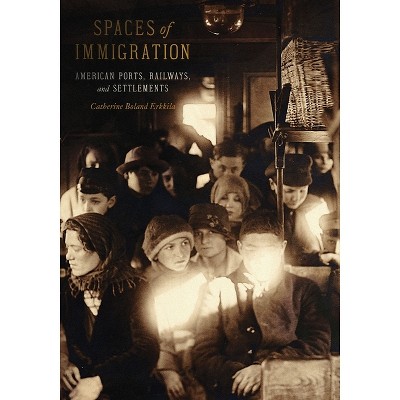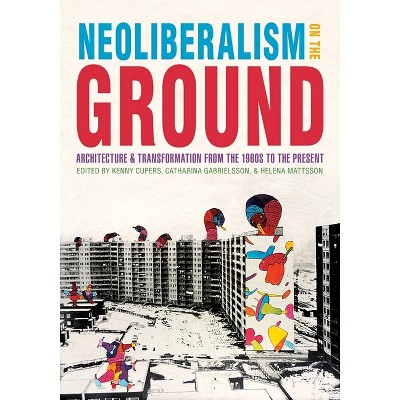Sponsored

Designing Tito's Capital - (Culture Politics & the Built Environment) by Brigitte Le Normand (Paperback)
$54.67Save $5.33 (9% off)
In Stock
Eligible for registries and wish lists
Sponsored
About this item
Highlights
- The devastation of World War II left the Yugoslavian capital of Belgrade in ruins.
- About the Author: Brigitte Le Normand is assistant professor of history at the University of British Columbia, Okanagan.
- 320 Pages
- History, Europe
- Series Name: Culture Politics & the Built Environment
Description
About the Book
The devastation of World War II left the Yugoslavian capital of Belgrade in ruins. Communist Party leader Josip Broz Tito saw this as a golden opportunity to recreate the city through his vision of socialism. In Designing Tito's Capital, Brigitte Le Normand analyzes the unprecedented planning process called for by the new leader, and the determination of planners to create an urban environment that would benefit all citizens.Book Synopsis
The devastation of World War II left the Yugoslavian capital of Belgrade in ruins. Communist Party leader Josip Broz Tito saw this as a golden opportunity to recreate the city through his own vision of socialism. In Designing Tito's Capital, Brigitte Le Normand analyzes the unprecedented planning process called for by the new leader, and the determination of planners to create an urban environment that would benefit all citizens.Led first by architect Nikola Dobrovic and later by Milos Somborski, planners blended the predominant school of European modernism and the socialist principles of efficient construction and space usage to produce a model for housing, green space, and working environments for the masses. A major influence was modernist Le Corbusier and his Athens Charter published in 1943, which called for the total reconstruction of European cities, transforming them into compact and verdant vertical cities unfettered by slumlords, private interests, and traffic congestion. As Yugoslavia transitioned toward self-management and market socialism, the functionalist district of New Belgrade and its modern living were lauded as the model city of socialist man.
The glow of the utopian ideal would fade by the 1960s, when market socialism had raised expectations for living standards and the government was eager for inhabitants to finance their own housing. By 1972, a new master plan emerged under Aleksandar Ðordevic, fashioned with the assistance of American experts. Espousing current theories about systems and rational process planning and using cutting edge computer technology, the new plan left behind the dream for a functionalist Belgrade and instead focused on managing growth trends. While the public resisted aspects of the new planning approach that seemed contrary to socialist values, it embraced the idea of a decentralized city connected by mass transit.
Through extensive archival research and personal interviews with participants in the planning process, Le Normand's comprehensive study documents the evolution of 'New Belgrade' and its adoption and ultimate rejection of modernist principles, while also situating it within larger continental and global contexts of politics, economics, and urban planning.
Review Quotes
Designing Tito's Capital represents a great contribution to the understanding of urban planning in socialist states which does not fail to deeply consider also wider social and political aspects.-- "Southeastern Europe"
A must-read for anyone interested in the complexity of industrial modernity and its interplay with architecture and city planning. The book will be very useful to urban and architectural historians in its thoughtful analysis of the application of the principles of the 1934 Athens Charter to Yugoslav socialist conditions . . . Area scholars of Central/Eastern Europe will find it engaging because it advances understanding of the unique political conditions and intellectual debates that made Yugoslavia the Eastern Bloc social and economic miracle that it once was. Sociologists and anthropologists will learn much about the intricacies of everyday life in a large International Style community of the type that sprang around the large cities across the world at the time.-- "Canadian Slavonic Papers"
A razor-sharp analysis of how socialism and modernism intertwined in postwar Eastern Europe. Le Normand has written a smart, incisive history of modern design and planning in a little known capital city.-- "Rosemary Wakeman, Fordham University"
A valuable and very detailed piece of research, which will be a good reference for anyone researching postwar Belgrade in such disciplines as history, architectural history, and the history of urban planning, as well as background for urban sociology-oriented research. Scholars in cultural studies, sociology, and urban planning will also find it useful for comparative or in-depth exploration.-- "H-Net Reviews"
Le Normand's book is based on impressive research into Yugoslav primary sources, and it represents an important addition to a growing body of literature on socialist Yugoslavia.-- "Journal of Modern History"
Making a welcome return to the original focus of urban history, Le Normand's study takes us through the planning debates and processes that sought to transform Belgrade into a modern European city after the Second World War. It tracks the planners' surprising transition from an avowedly socialist, centralized, Soviet-style model--to a decentralized, market-driven approach informed by the American experience.-- "John R. Lampe, University of Maryland"
This is an excellent and important study of urban planning in postwar Yugoslavia. This superb study tells us that more needs to be written about the relationship of eastern and western planning, which will, I suspect, force us to revisit conventional narratives of the Cold War.-- "Slavic Review"
About the Author
Brigitte Le Normand is assistant professor of history at the University of British Columbia, Okanagan.Dimensions (Overall): 10.02 Inches (H) x 7.11 Inches (W) x .65 Inches (D)
Weight: 1.69 Pounds
Suggested Age: 22 Years and Up
Number of Pages: 320
Series Title: Culture Politics & the Built Environment
Genre: History
Sub-Genre: Europe
Publisher: University of Pittsburgh Press
Theme: Eastern
Format: Paperback
Author: Brigitte Le Normand
Language: English
Street Date: July 16, 2014
TCIN: 92524226
UPC: 9780822962991
Item Number (DPCI): 247-37-0549
Origin: Made in the USA or Imported
If the item details aren’t accurate or complete, we want to know about it.
Shipping details
Estimated ship dimensions: 0.65 inches length x 7.11 inches width x 10.02 inches height
Estimated ship weight: 1.69 pounds
We regret that this item cannot be shipped to PO Boxes.
This item cannot be shipped to the following locations: American Samoa (see also separate entry under AS), Guam (see also separate entry under GU), Northern Mariana Islands, Puerto Rico (see also separate entry under PR), United States Minor Outlying Islands, Virgin Islands, U.S., APO/FPO
Return details
This item can be returned to any Target store or Target.com.
This item must be returned within 90 days of the date it was purchased in store, shipped, delivered by a Shipt shopper, or made ready for pickup.
See the return policy for complete information.
Frequently bought together

$12.65
MSRP $19.95
Buy 1, get 1 50% off select books
5 out of 5 stars with 4 ratings
Trending Non-Fiction

$15.68
Buy 1, get 1 50% off select books
4.8 out of 5 stars with 205 ratings

Highly rated
$19.31
was $20.98 New lower price
Buy 1, get 1 50% off select books
4 out of 5 stars with 68 ratings

$18.28
was $19.58 New lower price
Buy 1, get 1 50% off select books
4.7 out of 5 stars with 17 ratings

$4.59
MSRP $7.99
Buy 1, get 1 50% off select books
4.8 out of 5 stars with 124 ratings

$6.20
MSRP $10.95
Buy 1, get 1 50% off select books
4.8 out of 5 stars with 33 ratings

$7.09
MSRP $9.99
Buy 1, get 1 50% off select books
4.9 out of 5 stars with 46 ratings
Discover more options

$65.99
Buy 1, get 1 50% off select books
5 out of 5 stars with 1 ratings









